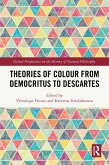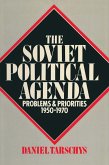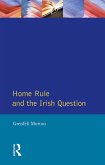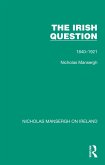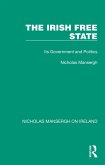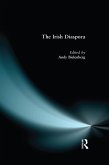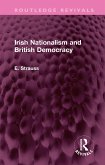Thomas Duddy
A History of Irish Thought (eBook, PDF)
39,95 €
39,95 €
inkl. MwSt.
Sofort per Download lieferbar

20 °P sammeln
39,95 €
Als Download kaufen

39,95 €
inkl. MwSt.
Sofort per Download lieferbar

20 °P sammeln
Jetzt verschenken
Alle Infos zum eBook verschenken
39,95 €
inkl. MwSt.
Sofort per Download lieferbar
Alle Infos zum eBook verschenken

20 °P sammeln
Thomas Duddy
A History of Irish Thought (eBook, PDF)
- Format: PDF
- Merkliste
- Auf die Merkliste
- Bewerten Bewerten
- Teilen
- Produkt teilen
- Produkterinnerung
- Produkterinnerung

Bitte loggen Sie sich zunächst in Ihr Kundenkonto ein oder registrieren Sie sich bei
bücher.de, um das eBook-Abo tolino select nutzen zu können.
Hier können Sie sich einloggen
Hier können Sie sich einloggen
Sie sind bereits eingeloggt. Klicken Sie auf 2. tolino select Abo, um fortzufahren.

Bitte loggen Sie sich zunächst in Ihr Kundenkonto ein oder registrieren Sie sich bei bücher.de, um das eBook-Abo tolino select nutzen zu können.
This is the first complete introduction to Irish thought ever available. This volume will be of great value to anyone interested in Irish culture and its intellectual history.
- Geräte: PC
- mit Kopierschutz
- eBook Hilfe
- Größe: 4.18MB
Andere Kunden interessierten sich auch für
![Theories of Colour from Democritus to Descartes (eBook, PDF) Theories of Colour from Democritus to Descartes (eBook, PDF)]() Theories of Colour from Democritus to Descartes (eBook, PDF)43,95 €
Theories of Colour from Democritus to Descartes (eBook, PDF)43,95 €![The Soviet Political Agenda: Problems & Priorities, 1950-1970 (eBook, PDF) The Soviet Political Agenda: Problems & Priorities, 1950-1970 (eBook, PDF)]() Daniel TarschysThe Soviet Political Agenda: Problems & Priorities, 1950-1970 (eBook, PDF)44,95 €
Daniel TarschysThe Soviet Political Agenda: Problems & Priorities, 1950-1970 (eBook, PDF)44,95 €![Home Rule and the Irish Question (eBook, PDF) Home Rule and the Irish Question (eBook, PDF)]() Grenfell MortonHome Rule and the Irish Question (eBook, PDF)40,95 €
Grenfell MortonHome Rule and the Irish Question (eBook, PDF)40,95 €![The Irish Question (eBook, PDF) The Irish Question (eBook, PDF)]() Nicholas ManserghThe Irish Question (eBook, PDF)31,95 €
Nicholas ManserghThe Irish Question (eBook, PDF)31,95 €![The Irish Free State (eBook, PDF) The Irish Free State (eBook, PDF)]() Nicholas ManserghThe Irish Free State (eBook, PDF)33,95 €
Nicholas ManserghThe Irish Free State (eBook, PDF)33,95 €![The Irish Diaspora (eBook, PDF) The Irish Diaspora (eBook, PDF)]() Andrew BielenbergThe Irish Diaspora (eBook, PDF)65,95 €
Andrew BielenbergThe Irish Diaspora (eBook, PDF)65,95 €![Irish Nationalism and British Democracy (eBook, PDF) Irish Nationalism and British Democracy (eBook, PDF)]() E. StraussIrish Nationalism and British Democracy (eBook, PDF)29,95 €
E. StraussIrish Nationalism and British Democracy (eBook, PDF)29,95 €-
-
-
This is the first complete introduction to Irish thought ever available. This volume will be of great value to anyone interested in Irish culture and its intellectual history.
Dieser Download kann aus rechtlichen Gründen nur mit Rechnungsadresse in A, B, BG, CY, CZ, D, DK, EW, E, FIN, F, GR, HR, H, IRL, I, LT, L, LR, M, NL, PL, P, R, S, SLO, SK ausgeliefert werden.
Produktdetails
- Produktdetails
- Verlag: Taylor & Francis eBooks
- Seitenzahl: 384
- Erscheinungstermin: 10. September 2012
- Englisch
- ISBN-13: 9781134623532
- Artikelnr.: 38252427
- Verlag: Taylor & Francis eBooks
- Seitenzahl: 384
- Erscheinungstermin: 10. September 2012
- Englisch
- ISBN-13: 9781134623532
- Artikelnr.: 38252427
- Herstellerkennzeichnung Die Herstellerinformationen sind derzeit nicht verfügbar.
Thomas Duddy teaches in the Department of Philosophy at the National University of Ireland, Galway. He is author of Mind, Self and Interiority (1995).
Preface Acknowledgements
1 Interpreting Marvels: The Irish Augustine
Enter, the Irish Augustine The theology of the Flood The theology of
marvels The theology of angelic ministry The Irish Augustine and the
African Doctor
2 The Philosophy of Creation: John Scottus Eriugena
The five modes of interpretation The four conceptions of nature Nature,
theophany, and pantheism The gendered and the pristine body The return to
God Eriugena and the cult of the Free Spirit Scholars or thinkers: A
postscript on Peter of Ireland and Richard Fitzralph
3 Nature Observed: Robert Boyle, William Molyneux, and the New Learning
Robert Boyle, the Christian virtuoso Touching the spring of the air: A new
departure ' A piece of green-wood burning': Boyle against the elements A
thinking gentleman: William Molyneux, new learner and patriot Mr Molyneux
to Mr Locke: An Anglo-Irish correspondence Against the self-image of the
age: Michael Moore, a Paris Aristotelian from Ireland
4 John Toland and the Ascendancy of Reason
Reason, revelation, and meaning Tyranny, superstition, and the politics of
pantheism 'As in a glass darkly': Peter Browne and the argument from
analogy Other partisans of mystery: Edward Synge and Philip Skelton God,
good, and privation: The theodicy of William King Spirit and motion: The
Philosophical animism of Robert Clayton
Wonderfully Mending the World: George Berkeley and Jonathan Swift
Seeing things: Berkeley's theory of vision Seeing (and not seeing) things:
Berkeley's philosophy of perception The visible language of god The
converting imagination: Swift against the moderns Modernism as madness: The
moral of the Tale Abolishing Christianity: Swift against the free thinkers
An unsentimental journey: Gulliver and the perversion of reason
6 Against the Selfish Philosophers: Francis Hutcheson, Edmund Burke, and
James Usher
Hutcheson and the stratagems of self-love The pleasures of morality Vice
and cruelty explained The politics of happiness and the pleasures of civil
union Reflection and reaction: the life and thought of Edmund Burke The
taste of fear: Burke's aesthetics of sublimity From the sublime to the
political: Burke and the philosophy of custom 'Shadowy similitudes': James
Usher on the limits of language 'A benevolent conspiracy': Ireland and the
thought of revolution
7 Peripheral Visions (1): Irish Thought in the Nineteenth Century
Daniel O'Connell and Benthamism Anti-Union, anti-Credo, anti-Malthus: The
subversive thought of George Ensor Producing happiness: The radical
utilitarianism of William Thompson Happiness and suffrage: The feminist
utilitarianism of Anna Doyle Wheeler The power of circumstance: The
holistic philosophy of Henry MacCormac
8 Peripheral Visions (2): Irish Thought in the Nineteenth Century
English theory, Irish facts: John Elliot Cairnes and the turn of political
economy Religion and the science of genesis: Darwin in Ireland - John
Tyndall, scientific evangelist Three non-Darwinian evolutionists: Gerald
Molloy, J.J. Murphy, and G.G. Stokes Religion, rivalry, and progress: The
social Darwinism of Benjamin Kidd Ethics and the primal nebula: Frances
Power Cobbe - Varieties of Irish idealism: From William Rowan Hamilton to
Oscar Wilde
9 Between Extremities: Irish Thought in the Twentieth Century
Between self and anti-self: The visionary idealism of W.B. Yeats The dreams
of reason: J.O. Wisdom on the unconcsious origins of thought Against
method: M. O'C. Drury on the imprisoned mind 'Unutterable particularities':
Iris Murdoch on the ethics of attention Being in the middle: William
Desmond on tragedy, 'idiocy', and intimacy 'A vision of being free': Philip
Pettit on mind, society, and the res publica
1 Interpreting Marvels: The Irish Augustine
Enter, the Irish Augustine The theology of the Flood The theology of
marvels The theology of angelic ministry The Irish Augustine and the
African Doctor
2 The Philosophy of Creation: John Scottus Eriugena
The five modes of interpretation The four conceptions of nature Nature,
theophany, and pantheism The gendered and the pristine body The return to
God Eriugena and the cult of the Free Spirit Scholars or thinkers: A
postscript on Peter of Ireland and Richard Fitzralph
3 Nature Observed: Robert Boyle, William Molyneux, and the New Learning
Robert Boyle, the Christian virtuoso Touching the spring of the air: A new
departure ' A piece of green-wood burning': Boyle against the elements A
thinking gentleman: William Molyneux, new learner and patriot Mr Molyneux
to Mr Locke: An Anglo-Irish correspondence Against the self-image of the
age: Michael Moore, a Paris Aristotelian from Ireland
4 John Toland and the Ascendancy of Reason
Reason, revelation, and meaning Tyranny, superstition, and the politics of
pantheism 'As in a glass darkly': Peter Browne and the argument from
analogy Other partisans of mystery: Edward Synge and Philip Skelton God,
good, and privation: The theodicy of William King Spirit and motion: The
Philosophical animism of Robert Clayton
Wonderfully Mending the World: George Berkeley and Jonathan Swift
Seeing things: Berkeley's theory of vision Seeing (and not seeing) things:
Berkeley's philosophy of perception The visible language of god The
converting imagination: Swift against the moderns Modernism as madness: The
moral of the Tale Abolishing Christianity: Swift against the free thinkers
An unsentimental journey: Gulliver and the perversion of reason
6 Against the Selfish Philosophers: Francis Hutcheson, Edmund Burke, and
James Usher
Hutcheson and the stratagems of self-love The pleasures of morality Vice
and cruelty explained The politics of happiness and the pleasures of civil
union Reflection and reaction: the life and thought of Edmund Burke The
taste of fear: Burke's aesthetics of sublimity From the sublime to the
political: Burke and the philosophy of custom 'Shadowy similitudes': James
Usher on the limits of language 'A benevolent conspiracy': Ireland and the
thought of revolution
7 Peripheral Visions (1): Irish Thought in the Nineteenth Century
Daniel O'Connell and Benthamism Anti-Union, anti-Credo, anti-Malthus: The
subversive thought of George Ensor Producing happiness: The radical
utilitarianism of William Thompson Happiness and suffrage: The feminist
utilitarianism of Anna Doyle Wheeler The power of circumstance: The
holistic philosophy of Henry MacCormac
8 Peripheral Visions (2): Irish Thought in the Nineteenth Century
English theory, Irish facts: John Elliot Cairnes and the turn of political
economy Religion and the science of genesis: Darwin in Ireland - John
Tyndall, scientific evangelist Three non-Darwinian evolutionists: Gerald
Molloy, J.J. Murphy, and G.G. Stokes Religion, rivalry, and progress: The
social Darwinism of Benjamin Kidd Ethics and the primal nebula: Frances
Power Cobbe - Varieties of Irish idealism: From William Rowan Hamilton to
Oscar Wilde
9 Between Extremities: Irish Thought in the Twentieth Century
Between self and anti-self: The visionary idealism of W.B. Yeats The dreams
of reason: J.O. Wisdom on the unconcsious origins of thought Against
method: M. O'C. Drury on the imprisoned mind 'Unutterable particularities':
Iris Murdoch on the ethics of attention Being in the middle: William
Desmond on tragedy, 'idiocy', and intimacy 'A vision of being free': Philip
Pettit on mind, society, and the res publica
Preface Acknowledgements
1 Interpreting Marvels: The Irish Augustine
Enter, the Irish Augustine The theology of the Flood The theology of
marvels The theology of angelic ministry The Irish Augustine and the
African Doctor
2 The Philosophy of Creation: John Scottus Eriugena
The five modes of interpretation The four conceptions of nature Nature,
theophany, and pantheism The gendered and the pristine body The return to
God Eriugena and the cult of the Free Spirit Scholars or thinkers: A
postscript on Peter of Ireland and Richard Fitzralph
3 Nature Observed: Robert Boyle, William Molyneux, and the New Learning
Robert Boyle, the Christian virtuoso Touching the spring of the air: A new
departure ' A piece of green-wood burning': Boyle against the elements A
thinking gentleman: William Molyneux, new learner and patriot Mr Molyneux
to Mr Locke: An Anglo-Irish correspondence Against the self-image of the
age: Michael Moore, a Paris Aristotelian from Ireland
4 John Toland and the Ascendancy of Reason
Reason, revelation, and meaning Tyranny, superstition, and the politics of
pantheism 'As in a glass darkly': Peter Browne and the argument from
analogy Other partisans of mystery: Edward Synge and Philip Skelton God,
good, and privation: The theodicy of William King Spirit and motion: The
Philosophical animism of Robert Clayton
Wonderfully Mending the World: George Berkeley and Jonathan Swift
Seeing things: Berkeley's theory of vision Seeing (and not seeing) things:
Berkeley's philosophy of perception The visible language of god The
converting imagination: Swift against the moderns Modernism as madness: The
moral of the Tale Abolishing Christianity: Swift against the free thinkers
An unsentimental journey: Gulliver and the perversion of reason
6 Against the Selfish Philosophers: Francis Hutcheson, Edmund Burke, and
James Usher
Hutcheson and the stratagems of self-love The pleasures of morality Vice
and cruelty explained The politics of happiness and the pleasures of civil
union Reflection and reaction: the life and thought of Edmund Burke The
taste of fear: Burke's aesthetics of sublimity From the sublime to the
political: Burke and the philosophy of custom 'Shadowy similitudes': James
Usher on the limits of language 'A benevolent conspiracy': Ireland and the
thought of revolution
7 Peripheral Visions (1): Irish Thought in the Nineteenth Century
Daniel O'Connell and Benthamism Anti-Union, anti-Credo, anti-Malthus: The
subversive thought of George Ensor Producing happiness: The radical
utilitarianism of William Thompson Happiness and suffrage: The feminist
utilitarianism of Anna Doyle Wheeler The power of circumstance: The
holistic philosophy of Henry MacCormac
8 Peripheral Visions (2): Irish Thought in the Nineteenth Century
English theory, Irish facts: John Elliot Cairnes and the turn of political
economy Religion and the science of genesis: Darwin in Ireland - John
Tyndall, scientific evangelist Three non-Darwinian evolutionists: Gerald
Molloy, J.J. Murphy, and G.G. Stokes Religion, rivalry, and progress: The
social Darwinism of Benjamin Kidd Ethics and the primal nebula: Frances
Power Cobbe - Varieties of Irish idealism: From William Rowan Hamilton to
Oscar Wilde
9 Between Extremities: Irish Thought in the Twentieth Century
Between self and anti-self: The visionary idealism of W.B. Yeats The dreams
of reason: J.O. Wisdom on the unconcsious origins of thought Against
method: M. O'C. Drury on the imprisoned mind 'Unutterable particularities':
Iris Murdoch on the ethics of attention Being in the middle: William
Desmond on tragedy, 'idiocy', and intimacy 'A vision of being free': Philip
Pettit on mind, society, and the res publica
1 Interpreting Marvels: The Irish Augustine
Enter, the Irish Augustine The theology of the Flood The theology of
marvels The theology of angelic ministry The Irish Augustine and the
African Doctor
2 The Philosophy of Creation: John Scottus Eriugena
The five modes of interpretation The four conceptions of nature Nature,
theophany, and pantheism The gendered and the pristine body The return to
God Eriugena and the cult of the Free Spirit Scholars or thinkers: A
postscript on Peter of Ireland and Richard Fitzralph
3 Nature Observed: Robert Boyle, William Molyneux, and the New Learning
Robert Boyle, the Christian virtuoso Touching the spring of the air: A new
departure ' A piece of green-wood burning': Boyle against the elements A
thinking gentleman: William Molyneux, new learner and patriot Mr Molyneux
to Mr Locke: An Anglo-Irish correspondence Against the self-image of the
age: Michael Moore, a Paris Aristotelian from Ireland
4 John Toland and the Ascendancy of Reason
Reason, revelation, and meaning Tyranny, superstition, and the politics of
pantheism 'As in a glass darkly': Peter Browne and the argument from
analogy Other partisans of mystery: Edward Synge and Philip Skelton God,
good, and privation: The theodicy of William King Spirit and motion: The
Philosophical animism of Robert Clayton
Wonderfully Mending the World: George Berkeley and Jonathan Swift
Seeing things: Berkeley's theory of vision Seeing (and not seeing) things:
Berkeley's philosophy of perception The visible language of god The
converting imagination: Swift against the moderns Modernism as madness: The
moral of the Tale Abolishing Christianity: Swift against the free thinkers
An unsentimental journey: Gulliver and the perversion of reason
6 Against the Selfish Philosophers: Francis Hutcheson, Edmund Burke, and
James Usher
Hutcheson and the stratagems of self-love The pleasures of morality Vice
and cruelty explained The politics of happiness and the pleasures of civil
union Reflection and reaction: the life and thought of Edmund Burke The
taste of fear: Burke's aesthetics of sublimity From the sublime to the
political: Burke and the philosophy of custom 'Shadowy similitudes': James
Usher on the limits of language 'A benevolent conspiracy': Ireland and the
thought of revolution
7 Peripheral Visions (1): Irish Thought in the Nineteenth Century
Daniel O'Connell and Benthamism Anti-Union, anti-Credo, anti-Malthus: The
subversive thought of George Ensor Producing happiness: The radical
utilitarianism of William Thompson Happiness and suffrage: The feminist
utilitarianism of Anna Doyle Wheeler The power of circumstance: The
holistic philosophy of Henry MacCormac
8 Peripheral Visions (2): Irish Thought in the Nineteenth Century
English theory, Irish facts: John Elliot Cairnes and the turn of political
economy Religion and the science of genesis: Darwin in Ireland - John
Tyndall, scientific evangelist Three non-Darwinian evolutionists: Gerald
Molloy, J.J. Murphy, and G.G. Stokes Religion, rivalry, and progress: The
social Darwinism of Benjamin Kidd Ethics and the primal nebula: Frances
Power Cobbe - Varieties of Irish idealism: From William Rowan Hamilton to
Oscar Wilde
9 Between Extremities: Irish Thought in the Twentieth Century
Between self and anti-self: The visionary idealism of W.B. Yeats The dreams
of reason: J.O. Wisdom on the unconcsious origins of thought Against
method: M. O'C. Drury on the imprisoned mind 'Unutterable particularities':
Iris Murdoch on the ethics of attention Being in the middle: William
Desmond on tragedy, 'idiocy', and intimacy 'A vision of being free': Philip
Pettit on mind, society, and the res publica

